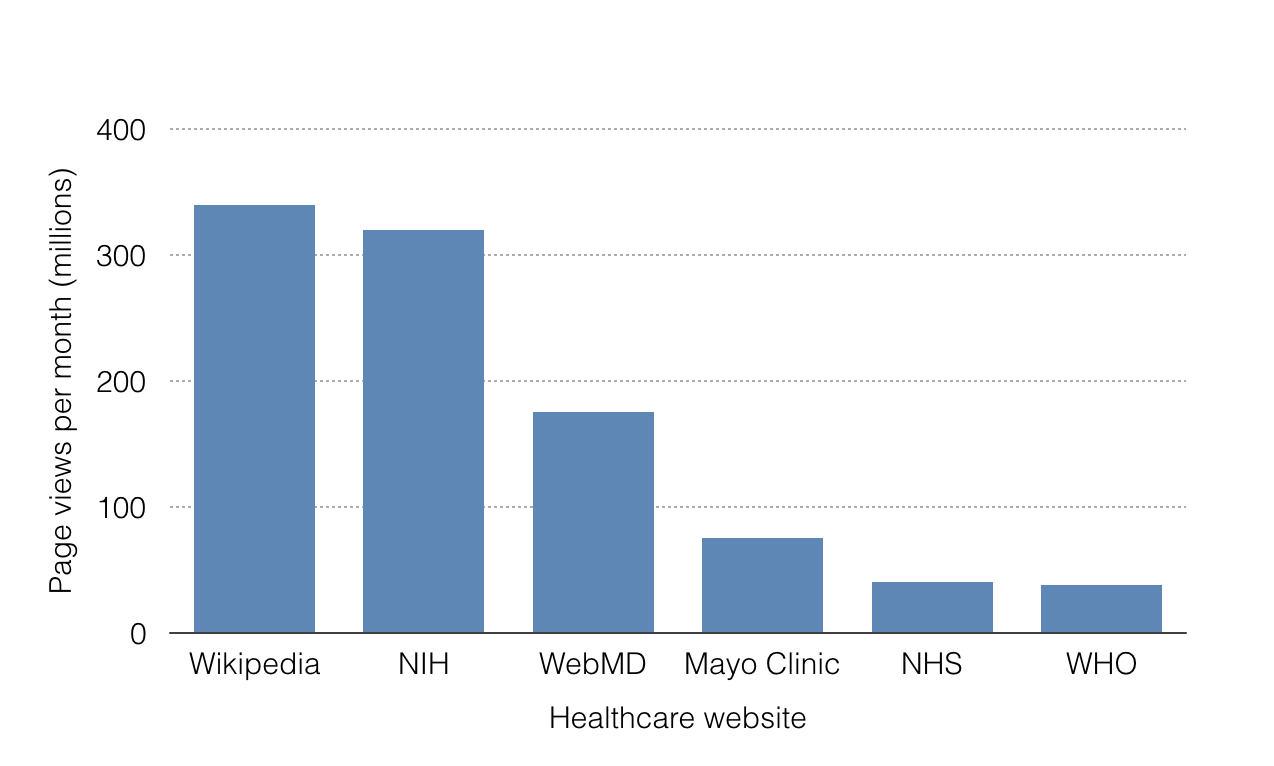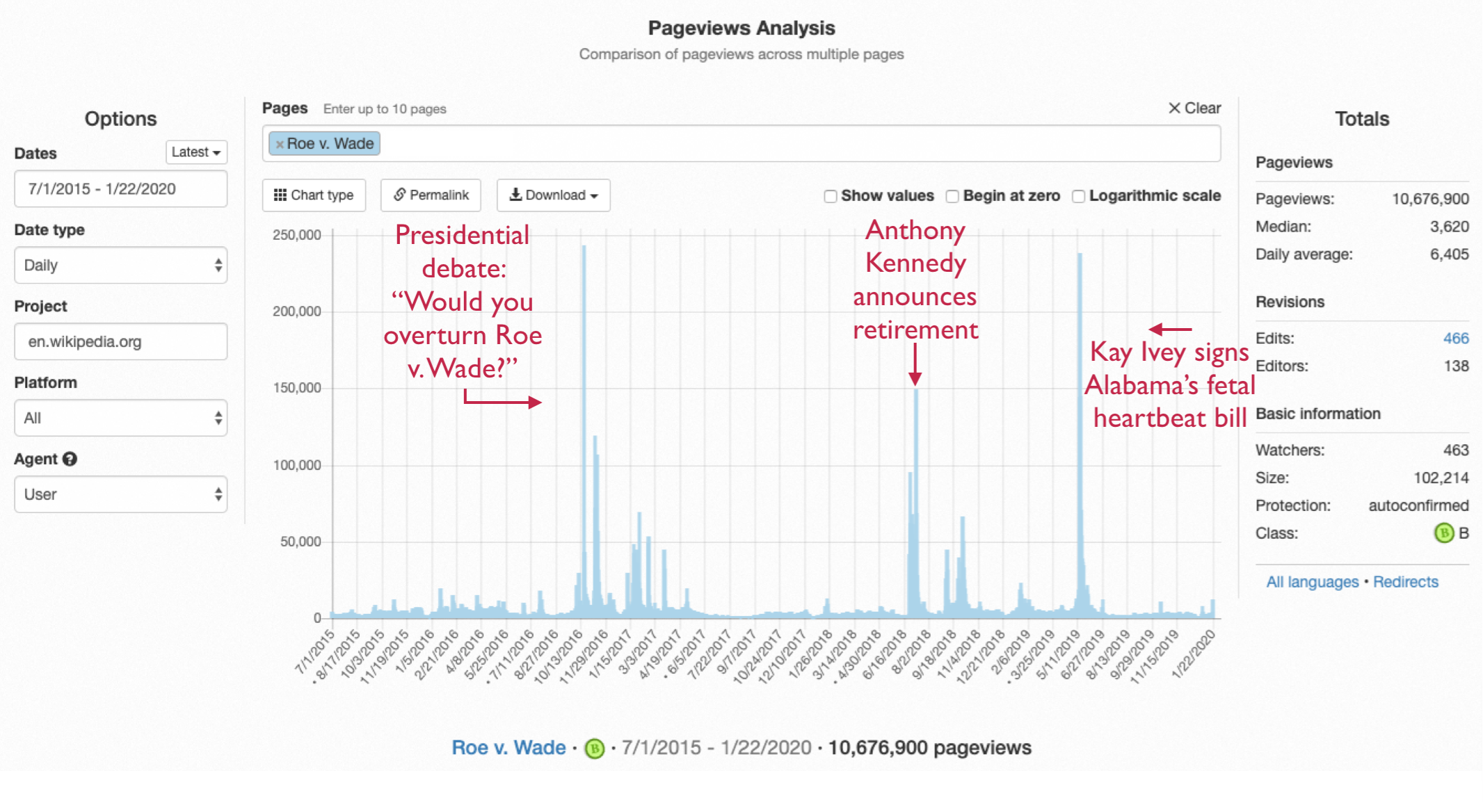Wikipedia is the most popular internet health content, more than NIH, Web MD, Mayo Clinic, and other sources (according to a 2014 study). Doctors use it. Patients use it. Policy makers use it.

Thus, the volunteers who curate Wikipedia’s content take the quality of medical articles very seriously. But keeping content accurate, complete, and up-to-date is a never-ending task with lots of work still to be done. Maybe it’s updating an outdated citation with the latest research. Or correcting a subtle misleading detail in the definition of a medical concept. Unfortunately, there are a limited number of Wikipedians available to update medical content and meet the high standards created by Wikipedia’s medical community. That’s why inviting more medical experts to participate can be so worthwhile.
Involving more subject-matter experts is not only beneficial for Wikipedia’s content, readers, and existing contributors. It’s a great experience for the medical professionals themselves. Just ask OB-GYNs Dr. Jennefer Russo and Colleen Denny, MD. In 2019, the Society of Family Planning (SFP) sponsored 2 courses to train their members how to add medical content to Wikipedia’s family planning-related articles. Jen, Colleen, and 30 other medical professionals, spent 3 months working closely with Wiki Education’s team to learn how Wikipedia works and improve pages related to their interests. We’re delighted that we will be running two more SFP Wiki Scholars courses in 2020, continuing this effort to bring high quality, rigorously scientific family planning information to the public. Earlier this week, Dr. Jennefer Russo, Dr. Denny, and I joined SFP’s Director of Grantmaking and Evaluation, Dr. Jenny O’Donnell, for a webinar to encourage others to join SFP’s upcoming Wiki Scholars courses.
Why Wikipedia?
“When I saw this being offered, I thought it was really exciting,” Colleen Denny, MD shared as part of the panel discussion. “As a layperson and even a doctor, I use Wikipedia all the time. It’s not only incredibly powerful, but also one of the few news sources in the United States today that is actually viewed neutrally. I’m a practicing clinician and do a lot of patient counseling, but in terms of sheer impact of getting medical information to my patients, it’s hard to beat Wikipedia. The impact is just so huge.”
When partnerships help both organizations fulfill their missions
SFP and Wiki Education saw an opportunity to partner because of a shared mission to give the public access to scientific research. As Dr. O’Donnell said in the webinar, “Though oftentimes our subject matter feels deeply political by its mere existence, the SFP sweet spot with Wiki Education is just putting the science forward.”
Wiki Education aims to reach more readers with the best, most accurate, up-to-date scientific research. Wikipedia is an excellent medium for science communication because it encourages contributors to distill complex topics into a digestible format. And we know people are looking for medical information about family planning. As the topics pop up in the news, readers flock to the Wikipedia articles to learn more.

Thanks to this partnership, we have supported 32 SFP members through 2 courses in 2019. They added 40,000 words, 390 new references, and that content has received over 2 million page views already. They have improved topics like tubal ligation, self-induced abortion, reproductive coercion, late termination of pregnancy, mifepristone, unintended pregnancy, doula, family planning in Uganda, vaginal bleeding, medical abortion, miscarriage, reproductive rights, compulsory sterilization, and more. Now, SFP members have two additional opportunities in 2020 to join this initiative.

What participation means for subject matter experts and for Wikipedia
Members of the Wikipedia community not only want to involve more subject matter experts in the open knowledge movement, it’s also a priority for many to help correct the gender disparity in editors and invite more women and non-binary identifying folks to lend their perspectives and expertise.
The scientists we work with feel a personal responsibility to get science out to the masses, and they can be a part of diversifying knowledge production on Wikipedia. In this week’s webinar panel, Dr. Jennefer Russo noted that as scientists and health professionals, “it’s part of our responsibility to balance out the voices at the table.”
What’s it like in the training course?
So why not just learn about Wikipedia’s mechanisms on your own? Through nearly 10 years of training new editors and creating resources for people to feel comfortable entering our community, we’ve found it helps to have other people learning right there with you.
“Maybe it’s generational, but for me and others in the course, the idea of editing an online resource that so many people look at and that seems static was intimidating,” Dr. Jennefer Russo shared. “Going in and changing information and feeling like we wouldn’t get in trouble was a mental hurdle that we overcame.”
“In the beginning it was hard to figure out what to start with,” Colleen agreed. “Should I write a whole new page? Or fix an existing one? Something I learned through this seminar course that I wouldn’t have known is that there are all these people curating Wikipedia, looking for and identifying articles that need to be fixed. Like WikiProject Women’s Health. Finding that kind of toe-hold is a good way to start.”
Ultimately, the live group discussions led by Scholars & Scientists Program Manager Ryan McGrady and Wikipedia Experts Ian Ramjohn and Elysia Webb during the course provided a space for SFP members to get comfortable with the culture of Wikipedia edits, as well as the mechanisms for making them. Now Colleen says she’s comfortable continuing to correct small things here and there as she sees them.
Colleen also touched on what surprised her most through the process of learning Wikipedia’s ins and outs, “At first I wondered, if someone else can switch my edits back to the misinformation that was there before, what’s the point? But I’ve been really surprised by how much the Wikipedia community protects accurate content. I really felt like if I’m putting good content out there, even if others in the community aren’t experts, they’ll protect what is well cited and well written.”
It was clear from our discussion that Colleen Denny, MD and Dr. Jennefer Russo feel a sense of deep mutual respect with other Wikipedians. They touched on the sense of responsibility they feel not only to share their research expertise outside the walls of academia, but also the responsibility they feel to the Wikipedia community to operate within the agreed-upon systems of content creation. Joining the Wikipedia community meets their goals of reaching more patients and freeing up more scientific knowledge for the masses. And their involvement in the community meets Wikipedia’s goals of making more information free, and providing accurate info. That symbiosis is the kind of balance we’re so happy to have found in our partnership with SFP.
Want to get involved?
If you’re a member of the Society of Family Planning, you can apply to participate in the next Wiki Scholars course. They are sponsoring this opportunity so that members need only donate their time to participate. Selected Wiki Scholars will meet weekly on Mondays from 11:00am–12:00pm Pacific/2:00–3:00pm Eastern from March 3, 2020 – May 18, 2020. Applications close next Monday, February 3rd.
Learn more about our partnership with the Society of Family Planning by reading our blog posts. For inquiries about partnering with Wiki Education, contact Director of Partnerships Jami Mathewson at jami@wikiedu.org or visit partner.wikiedu.org.
